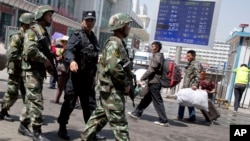An ongoing, sometimes bloody, conflict between minority communities in northwestern China and Beijing is starting to receive international attention, despite the silence of China’s own media.
China in recent years launched a series of “strike hard” campaigns in the Xinjiang region in the name of fighting separatism, religious extremism and terrorism. The targets of these campaigns, the minority Turkic-speaking, Muslim Uighurs, complain of pervasive ethnic discrimination, religious repression, and cultural suppression by China’s communist government.
In its annual report this week, Amnesty International cited the crackdown among its list of human rights abuses in China.
"The authorities stepped up already onerous restrictions on Islam with the stated aim of fighting 'violent terrorism and religious extremism,'" Amnesty International said.
"Uighurs faced widespread discrimination in employment, education, housing and curtailed religious freedom, as well as political marginalization," the report said.
It added that county governments had posted notices requiring schoolteachers to feed ethnic minority Uighur pupils with food and sweets to ensure they couldn't observe the fasting month of Ramadan.
17 killed in recent violence
A clash last week in Xinjiang’s in Aksu prefecture killed 17 people, including four policemen who were slashed with knives, nine attackers who were shot to death and four people killed by police gunfire, Radio Free Asia reported.
The incident came during house-to-house searches by police, who were attacked by a group of more than 10 people gathered in a house 150 meters from the police station in the town of Yaqaeriq.
“When they entered the house, there were 10 or so people in the house. The chief ordered them to disperse, at this point they rushed all together and snatched the rifle and handgun from Qasim Imir’s hand, then slashed him with the knifes and axes,” Yaqaeriq Deputy Mayor Turdahun Tohti told Radio Free Asia’s (RFA) Uighur service. Qasim Imir was the police chief of the town.
“Because the rest of the police were auxiliary police they did not have guns, so they ran for their lives, and the suspects chased them. When they closed up on them as they approached the police station, the armed police stationed there came out and started shooting,” Tohti added.
The showdown ended with Imir and three auxiliary police dead from knife and axe wounds, nine suspects shot to death by police and four passersby who were hit by police gunfire, he said.
Among the slain passersby were a man named Qul, head of the local hospital, and his daughter who, Tohti said, “ran so they were confused with the suspects and police shot them.”
Two local farmers were also mistakenly shot dead by police, he said.
Uighurs feel scrutiny, actions excessive
Uighurs say they chafe under strict police scrutiny and controls on their movements and violent clashes with police are not uncommon.
“The strike hard policy exceeds the prescribed limits,” said a worker in Bay county, who spoke on condition of anonymity.
“For example a farmer who helped tend his jailed friend’s cornfield was sentenced to three years as a ‘terrorist.’ He does not even know why he was sentenced,” the worker told RFA.
“Right now everybody is living in fear. There is no guarantee that they will not be arrested on bogus charges as well.”





